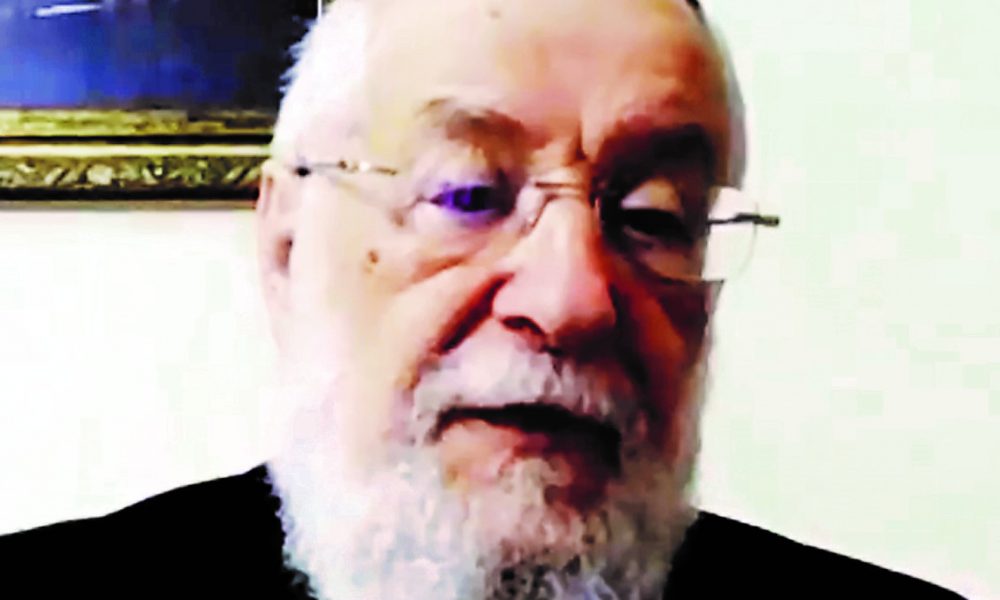Featured Item
Look back for guidance and optimism, says Israel’s chief rabbi

If the Jewish people could survive centuries of hardship and remain strong, we can be assured that we will emerge from our current difficulties with a strong sense of hope and optimism.
So said Rabbi Meir Lau, Holocaust survivor and former Chief Rabbi of Israel last Sunday. Lau shared insights into Tisha B’Av with South African Chief Rabbi Dr Warren Goldstein in an online event watched by hundreds.
“When we came out of the slavery of Egypt almost 4 000 years ago, there were many nations and cultures around us – Greece, Rome, Assyria, Lebanon, Persia, and others,” said Lau. “Where are they today? The Rome of Julius Caesar? Greece of Socrates? They’re no more.
“The only one which exists from that time is the Jewish people, in spite of the fact that we suffered more than the others. Our history is mostly in exile, yet we’ve survived with the same language, the same holidays, and the same customs.”
The only thing keeping us alive is our heritage, Lau believes.
“Our language, our Torah, and our beliefs are passed from generation to generation,” he said. “I said kaddish as a child in Buchenwald for my parents. I survived with a brother who taught me to say it after him and repeat his words although I didn’t understand any of it. That’s heritage.”
Tisha B’Av this year marks the 75th anniversary of Lau’s arrival in Israel in 1945, a fact that’s certainly not lost on him. “I arrived here 75 years ago with 220 other orphaned Jewish boys from Europe,” said Lau. “We arrived in Haifa three years before the state was established.
“I look around Israel today and I see the continuity of generations, maintaining a culture even 2 000 years after the destruction of the temple. What other nation has such a history? This is the power of tradition.”
Only Jewish unity can guarantee the longevity of tradition, said Lau. Sadly, we too often resort to hatred rather than love for our fellow Jews.
“We are champions in dying together,” said Lau. “To die as we did in the camps, where there was no difference between Ashkenazim and Sephardim, rich or poor, frum or not. We’re experts at dying together.
“But as for living together, we haven’t even begun our first lesson. We need to live together in spite of our differences. This is the lesson of Tisha B’Av.”
The temple can be rebuilt only if we develop a strong sense of Jewish unity, Lau believes.
“We are brothers of the same family,” he says. “Yet, I look around and can’t find baseless love, while there’s plenty of baseless hatred.
“Ashkenazi or Sephardi, we say the same shema that the 12 sons of Yaakov said when they came to their father’s deathbed. This makes us one family. Speaking good about one another is actually much easier because we are one family, so it should be the reality.”
Equally important is a continued sense of optimism that’s crucial for continuity and survival.
“Without optimism, we wouldn’t have survived,” said Lau. “We have to believe in a brighter future. Isaiah spoke about international peace in the future, with powerful nations who fought each other living in peace.
“Would you believe that Germany and France could shake hands after fighting each other in both world wars? Even Russia and America can stand together today. We in Israel want peace with all our neighbours, and we want them to see that we aren’t the enemy. We want them to prosper and we don’t hate anyone. This is what we stand for.”
Lau’s earlier visit to South Africa and meeting with the late Nelson Mandela illustrated this lesson well.
“I met with FW de Klerk and Nelson Mandela,” he recalled. “There were times I didn’t believe that two personalities like this could live together and find a common language, but they did. It was possible.
“I remember Mandela said to me: ‘We were both imprisoned, but I was luckier than you. You suffered more. I spent 26 years in prison, but they didn’t kill my parents like they did yours. Yet, if you became the chief rabbi of Israel and I the president of South Africa, we can be sure that the future will be good.’”
The same belief in a better future can be applied to our present reality of COVID-19. Lau stressed that our history and tradition as Jews are invaluable tools to help us.
“Before Moses passed away, he said to remember the days of the past, and to look at the generations,” said Lau. “Before he blessed the Jewish people, he told them to look back and to learn history in order to know our duty in the world and how to survive.
“If you respect the past, you have a good chance for the future. If you are connected to history, heritage, and the Torah it makes, you are part of a family.
“As one family with such a glorious past, we can overcome all difficulties, including this pandemic. We can hope for a full recovery speedily and soon.”